A hospital in West Texas is a bellwether for a young movement that teaches many of our deadly diseases can be mitigated, even cured, by a change in diet
Historically, mankind understood that good food means good health. Hippocrates, the Greek father of Western medicine, said “Let food be thy medicine and medicine be thy food.“ Over two millennia ago in the East, Tiruvalluvar wrote, “The pleasures of health abide in the man who eats moderately. The pains of disease dwell with him who eats excessively.” Those old wisdoms fell into disuse, and just 30 years ago a US doctor’s twelve years of training included a paltry two hours of nutritional science. Food’s healing powers were forgotten in the medical community. Then along came the evangelists Dean Ornish, Dr. John McDougall and T. Colin Campbell to talk about plants versus meats in our diet. Suddenly, doctors are entering the conversation. The story of this cultural and scientific shift is told below by two physicians and a health expert.
BY DR. SCOTT STOLL, PENNSYLVANIA
NEARLY 15 YEARS AGO I STARTED TO share with my family, friends, colleagues and patients that a diet consisting of whole plant-based foods can prevent, suspend and even reverse the majority of the diseases impacting the world. My message was met with skepticism: “Food is just food, it can’t be that important or influential;” cynicism: “You are nice, Dr. Stoll, but this is a little out there for a doctor;” and occasionally outright hostility: “Don’t talk to me about food, I need medical care!”
But a few people acted on the recommendation, and I watched as their lives were transformed: symptoms resolved, biomarkers normalized, medications discontinued, and life returned to their lives.
Few healthcare practitioners at that time shared a similar passion, philosophy and practice style. There were no food-as-medicine conferences, very few books or scientific articles about vegan or plant-based food, and non-existent support in the medical or academic arena. In the early days of Google, only a handful of results would return to a search for “whole food plant based.”
Two years ago, however, I experienced the early tremors of a cultural shift. During the annual dinner cruise that we host for our health immersions, a steward who served on the boat mentioned to me that he was reading about a whole-food, plant-based diet and had decided to make a change. I was stunned. To me this demonstrated a new level of cultural penetration.
So, what is a whole food plant based diet? It is a dietary lifestyle that maximizes the intake to whole plant foods and eliminates intake of processed and animal-derived foods. Consumption of meat, including chicken and fish, dairy products and eggs, as well as highly refined foods, like bleached flour, refined sugar and oil, are all eliminated or minimized.
Today a Google search for “whole food plant based” returns over 9.2 million results. New books are published monthly. Comparing 2016 to 2000, we see a tenfold annual increase in new peer-reviewed scientific articles. Nearly four years back I co-founded the International Plant Based Nutrition Healthcare Conference, with the goal and vision of educating, inspiring, equipping, and empowering healthcare practitioners to utilize whole, plant-based food as a cornerstone in their medical practices.
In 2016, more than 800 enthusiastic healthcare professionals from 20 countries attended the conference, including 20 from Japan. Each attendee returned home as a knowledgable and powerful advocate for positive change.
For example, Dr. Staton Awtrey, a cardiothoracic surgeon at Midland Health, his wife Blythe Awtrey and Marcy Madrid, VP of planning and marketing, have inspired their hospital to transform healthcare delivery for their community. In just the last two years they have helped to:

1. Add plant-based meals to the hospital menu;
2. Provide healthy plant-based options in the cafeteria;
3. Remove all fryers from the kitchen;
4. Start a monthly food-as-medicine journal club;
5. Create a dynamic community garden project;
6. Cultivate a monthly community plant-based meal gathering;
7. Start a lifestyle medicine clinic at the hospital;
8. Produce quality research studies on plant-based medical interventions;
9. Replace unhealthy snack options at the cafeteria checkout with healthy whole plant foods: good-bye candy bars, hello bananas;
10. Develop the annual Food as Medicine conference, expected to attract more than 1,000 people this year.
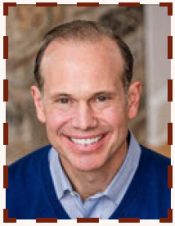
www.PlantricianProject.org
Midland Health has become a model for implementing a new paradigm of health care by providing the best true “health care” and disease prevention for their community.
Recent evidence suggests that the cultural mindset and belief systems around food are also changing. A Nielsen survey found that nearly 75% of consumers believe they can control their health through nutrition and 32% believe food can replace medicine. Sales of the super food kale rose annually at a 56.6% rate from 2009 to 2013, with more than a doubling of the number of farms producing kale. While not all things organic are healthy, the sale of organic food has nearly tripled in the last 10 years and continues to show positive annual growth. And shoppers have changed they way they buy food, with a significant trend toward minimally processed, locally grown foods with short, recognizable ingredient lists.
At the end of a busy day or on the weekend, when people eat away from home, 37% of US restaurant patrons in 2016 chose vegetarian or vegan options when dining out. In the last three years vegetarian menus have increased by 66%.
Our culture is only beginning to stir from its long, self-induced food coma. Like any young movement, it must overcome many challenges to create real, enduring change. But if we only look at the biggest challenges, we will miss the solutions that are in our own hands.
Every day we influence the culture around us with our choices: how we spend our money, how we use our words, how we help our neighbor, how we allocate our time, and how we invest our relational equity. Your choices, used wisely, will change your life, and your example will ignite change and inspire others. Eventually we will reach a tipping point when millions of people use their power of choice to positively impact their personal sphere of influence. And when those individual spheres finally coalesce, we will have transformed the culture.
One Doctor’s Experience
Less cancer, less heart disease, less diabetes
BY DR. STATON AWTRY, TEXAS
MIDLAND IS AN OIL TOWN OF ALMOST 130,000 people located in the Permian Basin of West Texas. Until about two years ago the health care community here was as conservative as rural Texas politics. That all began to change in 2015, when Dr. Scott Stoll traveled here to share his nontraditional perspective on health and wellness with physicians at Midland Memorial Hospital and with the general public at our local First Baptist Church.
Dr. Stoll is cofounder of the Plantrician Project and a prominent international leader in the grassroots movement to acknowledge and leverage the central importance of nutrition in wellness and in treatment of disease. Coronary artery disease, type 2 diabetes, hypertension, cancers of the breast, colon and prostate, and many autoimmune diseases are linked to an unhealthy dietary lifestyle, and Dr. Stoll specifically endorses a whole-foods, plant-based (WFPB) diet based upon the body of peer-reviewed research which documents not only its efficacy in preventing these common diseases, but also the unique ability of a WFPB diet to in many cases arrest or reverse disease.
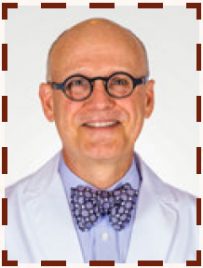
The response to his message was remarkable. It initiated a conversation in the hospital that led to the creation of a committee and subsequent major changes. Our inpatient menu now includes a WFPB option, our cafeteria offers healthy options and has eliminated the patently unhealthy ones, our director of food services and dieticians have embraced the concept of food as medicine and promote it, as have physicians, nurses, the administrative team and the hospital Board of Directors. Many of our employees are personally regaining health through participation in our hospital-based Complete Health Improvement Program (CHIP). A Lifestyle Medicine Clinic will be opening in a few months, and evidence-based nutritional education will be its cornerstone.
While medical schools in the United States have historically marginalized the significance of diet, the local medical community is beginning to understand that a whole-foods, plant-based diet leads to less cancer, less heart disease, less diabetes, fewer strokes, less osteoporosis, less Alzheimer’s disease, less obesity and less infirmity. It does, in fact, lead to health and vitality. This knowledge is changing the way many of us practice medicine and is bringing well-founded hope to our patients. Rather than merely mitigating and managing disease, we are experiencing the joy of helping others actually achieve health.
Recognizing that radically changing one’s diet can be challenging, we created a Monthly Community Meal Event to support and shepherd those seeking to transition to a healthy diet. For more than two years now, my wife sends out invitations and assigns recipes to those planning to attend. We then meet in a host’s home and share delicious, healthy food, have a short educational presentation, share testimonials, and generally walk this journey to health together. It has been, I believe, the key to our success. There are now more than 300 people on the invitation list, and each month we have from 40 to 80 participating.
A few days ago we held our May event. A local physician who recently joined our group shared his story. In spite of appearing healthy, he was dealing with recently diagnosed diabetes (type II). His fasting blood glucose was 394mg/dl, his Hgb A1c was 11, and his serum triglyceride level was 400. Eight weeks ago he committed to a WFPB diet to prevent the otherwise inevitable cascade of events he had seen play out in other family members: renal failure, blindness, amputations, heart attacks, and early death. His results are amazing, but more significantly, they are predictable. He lost 30 pounds he didn’t need, his fasting glucose plummeted to 86mg/dl, his Hgb A1c normalized to 5.4, and his triglycerides fell to 152 (upper limit of normal). He and his wife have changed the culture of food in their home. His entire family will benefit in the coming years and possibly for generations to come as a direct result. This is orders of magnitude more efficacious and fun than simply writing a prescription for metformin.
Enthusiastic community members have joined physicians and MMH administrators to create Healthy City, a nonprofit whose mission is to provide ongoing evidence-based nutrition education and support to the public and to increase local resources for those pursuing a healthy lifestyle. Healthy City will also produce the yearly Food is Medicine seminar for the general public. This event brings in internationally recognized experts to educate the people of West Texas. The first iteration last year was a resounding success, and we are actively preparing for this year’s event on August 12th.
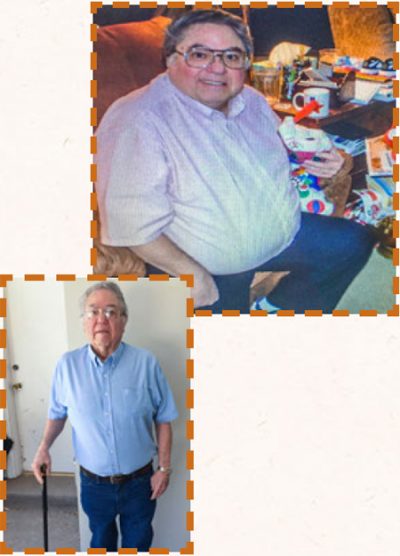
Change is possible: Following a heart attack and pneumonia, Terry Dummer changed his diet, lost 96 pounds and averted heart surgery.
One participant at last year’s event was a 32-year-old man with debilitating multiple sclerosis. He was an invalid and needed a walker to ambulate. He was becoming progressively weaker as his disease advanced. He couldn’t tolerate more aggressive medical intervention, and worst of all, he had bowel incontinence for six years. He had seen multiple specialists, but no one could help with this. Based upon what he learned at the Food is Medicine event, he changed his diet. Within days his incontinence resolved. Within weeks his strength returned and he no longer required any assistance to walk. He also lost weight. After being an invalid for years, he began looking for a job.
Helping people achieve and maintain health is the right way to practice medicine, and we are seeing our efforts bear fruit. The last three patients coming to my office to discuss heart surgery, for example, were already aware of the WFPB movement in our community and wanted to know more. I even have cardiologists referring patients to me for counseling.
Mr. Terry Dummer was admitted to MMH almost two years ago with a heart attack. I was asked to evaluate him for coronary artery bypass, but Mr. Dummer developed respiratory failure as a result of aspiration pneumonia, and he was not a candidate for surgery. When he improved and no longer required life support, he decided to change his diet while his lungs recovered further. He adopted Dr. Caldwell Esselstyn’s dietary recommendations for preventing and reversing coronary artery disease (CAD), and he has done beautifully without surgery. His last nuclear medicine stress test was normal, which is impressive given the severe blockages present in all three major coronary arteries.
I’m confident Mr. Dummer would have done well with surgery; most people do. But if he had opted for surgery instead of lifestyle change, he would still be morbidly obese. Instead, he has lost 96 pounds. He would still be an invalid in a wheelchair. Instead, he walks with a cane. He would still be on at least 15 medications. Instead, he is only on three. He would still be sick—but instead, he has become healthy.

We all make choices: More and more we are aware that our lifestyle impacts health and the quality of life. Dr. Awtry is inspired when patients begin to wean away from a sedentary, junk food way of living and embrace fresh foods and exercise.
In medical school I was taught that coronary artery disease is incurable and relentlessly progressive. But as Dr. Esselstyn explains, it is actually “a toothless paper tiger that need never ever to exist, and if it does exist it need never ever progress.”
My goal as a physician and Healthy City board member is to educate people in our community to understand that more money, more doctors, more drugs, stents, and high-tech interventions cannot undo the damage of an unhealthy diet. My recommendation is to skip the unnecessary drugs and procedures, keep your money, eat a delicious whole-foods, plant-based diet, avoid or reverse your diabetes and hypertension, lose weight, feel better, and reduce your risk for prostate, colon and breast cancers—in short, actually become healthy.
The Healing Power of Food
One health professional’s personal journey
BY MARCY MADRID
WHAT WE HAVE LEARNED IN OUR health system over the past several years is that people don’t just come to us physically sick and broken; they are coming to us with all sorts of emotional, social, mental and spiritual illnesses that have festered for years and finally manifested into a physical sickness or disease.
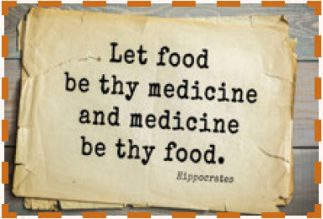
We know from research that stress, unforgivingness and constant worrying can cause the physical breakdown of our bodies. According to an article published by the Mayo Clinic, the long-term activation of the stress-response system and the subsequent overexposure to cortisol and other stress hormones can disrupt almost all your body’s processes. This puts you at increased risk of numerous health problems including anxiety, depression, digestive problems, heart disease, weight gain, memory and concentration impairment, and immune system deficiencies such as MS.
This means when you talk about truly healing the whole person, you have to look beyond just what’s going on physically. As healthcare providers, it’s more important than ever that we look at what’s happening beneath the surface, emotionally and socially. This is the essence of holistic health, and it’s the only way we can bring comprehensive health improvement to our patients.
The importance of food in all of this is that food can be a gateway drug or the key to our health.
Many people are oblivious to the fact that certain foods have really become a legal version of a drug in people’s lives. Research shows us that sugar is more addictive than cocaine, and fatty and salty foods set off the same sensory receptors in our brain as do alcohol and drugs. People are no longer just eating to satisfy a hunger or to sustain their life; they are eating to medicate themselves, and not in a good way. Think about the reasons that you eat and how often you’re eating just because you truly are hungry. Now think about how many times you eat when you’re stressed, when you’re excited and want to celebrate, when you’re depressed or sad. I would venture to say that most of us eat for these non-hunger related reasons almost as much as we eat for reasons of true, physical sustainment.
Within the Midland Health system in Midland, Texas, we started the conversation about the science behind food and the health of our bodies, but it has now grown into a much deeper discussion about the health of our souls. And that has created the most profound impact.
In 2014, we began an initiative called the culture of ownership, sparked by some great insight and wisdom from culture guru Joe Tye. We’d been struggling to improve our failing patient satisfaction scores, and realized we could not expect to solve the problem by offering another “program of the month” telling people to be nice to each other. Joe had revealed to us that our behaviors are driven by personal accountability, ownership and ultimately our own personal values, not by some top-down mandate to be kind.
We started emphasizing values. We sent all our employees to a peer-instructed course helping them identify the values they may intrinsically hold but don’t often recognize. That’s when something amazing happened: People cried. Lots. The classes had to be stocked full of tissues. We found our people were not being ugly and hateful and careless because they woke up wanting to make everyone’s life miserable; they were fighting back their own personal enemies every day, and it was hard enough to just put a smile on and plow through their task lists.
No wonder they were struggling with being kind and caring to others. Those feelings were buried beneath years of unresolved conflicts, un-forgiveness and personal grief. Knowing the impact of constant stress on our physical bodies and the resulting reliance on food as a feel-better drug, it’s no wonder hospital employees and clinicians are among the unhealthiest people in our nation.
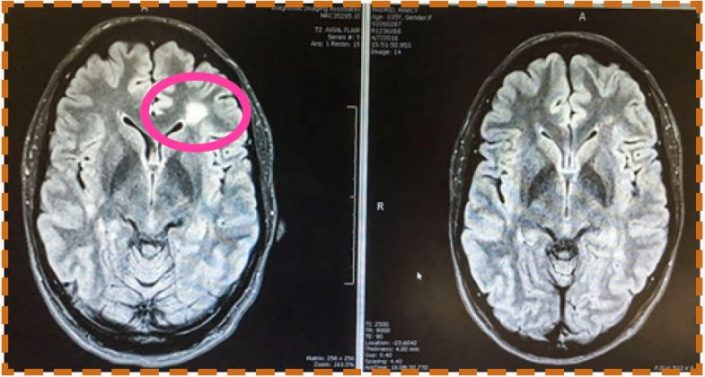
After sharing their struggles and dreams with their peers in these classes, our employees realized they weren’t living the values they claimed to hold, because they didn’t stop long enough to think about those values. When they did, something broke in them and they finally felt a release, allowing them to take ownership of their lives and improve their health along the way.
In 2015 a group of local physicians introduced several of our administrators, including myself, to a new understanding of the role of nutrition in our healthcare plans and goals. We began realizing the impact of food on our health and its relation to the diseases we fight every day in our patients. It was as if someone suddenly turned the light on in our hospital for the first time, and all these areas that were dirty, cluttered and hindering the healing process were suddenly revealed.
So began the cleanup efforts. We cleaned up our inpatient meals, offering plant-based options to patients in our care. We cleaned up the cafeteria, offering plant-based, vegan and vegetarian options, and eliminating blatantly unhealthy items like candy bars, corn dogs and milk shakes. We switched out all our deep grease fryers for air fryers and cut back all our 2-3 serving containers of sodas and desserts to only one serving size.
We began changing the way we educated the public on nutrition, becoming much more clear on what exactly a healthy diet looks like and why it’s not a protein shake, a low-carb meal or a diet pill. We held public events and health conferences, and initiated a community garden project where locals can rent a plot for $15 a season and learn how to grow their own food alongside local experts and master gardeners.
Finally, and probably most importantly, we began seriously looking at our sickest employees and offering them something more meaningful to impact their health than another step program or calorie-counting diet plan.
We incorporated CHIP (Complete Health Improvement Program) and Nelson Campbell’s Plant Pure Nation products into a more holistic wellness program that focused much more on lifestyle medicine.

Eating as sport: Contestants chow down at the 2016 Nathan’s Famous Hot Dog Eating Contest at Coney Island, New York. Overeating places harmful burdens on all systems and organs of the body. Amazingly, every pound of additional weight a person gains requires 3,000 miles of blood capillaries, which add to the heart’s workload.
We are now actively planning the opening of a lifestyle medicine clinic on one of our campuses to begin offering a full-scale and holistic wellness program. After taking dozens of our sick employees through this program, we have seen them not only lower and eliminate medications, but also drop significant weight—both the physical kind and the emotional kind. Dr. Scott Stoll recently visited a class potluck for our program participants and asked them to name the most meaningful takeaway for them in the CHIP program. One lady raised her hand and said forgiveness. She had learned to forgive herself and others who hurt her in the past and now realizes she can move on. Isn’t that remarkable? A discussion around healthy food choices and the control and addictive power food can have over our lives has led our employees to uncover deeper and more prevalent health issues going on beneath the surface. This is true healthcare—healing the body, mind and soul to bring real and permanent health to those we were called to care for.
My own story is similar. I was diagnosed with multiple sclerosis in October, 2015, the same month I was invited to participate on a committee to start planning for the lifestyle medicine clinic. You can call it a coincidence, but I call it divine intervention. Presented with a debilitating and depressing diagnosis and a prescription pad full of names I couldn’t pronounce, I was faced with a decision to go along with the cultural norm and my physician’s advice or try this new thing they called “food as medicine.” It wasn’t new at all; just to us.
Thankfully, I have a strong and supportive husband who stood with me in prayer through the days and weeks following that diagnosis. Through our faith, we found the strength and answers we so desperately needed. After a month of crippling side effects and extreme hair loss, I stopped the meds and went fully plant based. Six months later, my disease was stabilized and even regressing as a lesion on my brain began to shrink.
Food was definitely and obviously the key, but it was just that, a key that opened a door to a much bigger issue of true health. After facing food-related social struggles, rejection, judgment and my own personal battles with food addiction,
I realized this healing God was bringing me was going much deeper than what I put on my fork every day. I had to come to terms with the constant stress I put myself under, stress which caused cravings I was now more aware of. I had to deal with unresolved conflicts and un-forgiveness in my past and present that I was holding on to and pushing down, which resulted in food-related responses like binge eating and unnecessary snacking.
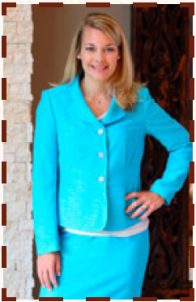
Most of all, I recognized the complexity of these bodies we inhabit and how delicate the balance can be between health and sickness if we are not constantly aware of who we are and what’s most important to us in each moment of every day. I’m not yet completely healed of my MS, but through the gradual healing taking place in my physical body, there is a much more profound and meaningful healing taking place in my mind, my heart and my soul. And that kind of healing transcends the impact of physical health and wellness, incredibly.
This experience has given me a fresh perspective on my profession, a new understanding of health and disease. Our problems may look like obesity, diabetes and heart disease, but the real issues lie beneath the surface, in our hearts and souls. It’s just being manifested though food addictions and easy access to our country’s legal drugs of choice—sugar, fat and salt.
If our health system—or any other—is to succeed in improving health, not just sustaining life, we have to go beyond just treating the disease and begin to effectively treat the person—body, mind and spirit.
